- Home
- Nancy Pickard
The Scent of Rain and Lightning Page 14
The Scent of Rain and Lightning Read online
Page 14
“What time did Billy leave the room?”
“Had to have been around eleven. Wasn’t all that long since he laid down.”
“Did he come in to sleep with you?” the sheriff asked Valentine.
“No,” she said, her lower lip trembling. She’d asked the sheriff what Billy had done this time, but he hadn’t told her yet.
“Did you know he wasn’t in the house?”
“Not until I got up this morning and looked out back.”
“Do either of you know what Billy did or where he went between the time he got off this couch and the time Mrs. Crosby saw him in the hammock?”
They both said no.
“Where is Billy’s truck, Mrs. Crosby?”
She looked relieved to be able to say, “Oh, he doesn’t have it anymore! Mr. Linder bought it. It’s parked behind Hugh-Jay and Laurie’s house.”
“No,” the sheriff told her, “it isn’t there now.”
He made that fact sound ominous, which confused and scared her more.
“Mrs. Crosby, does Billy have any guns?”
She looked terrified now. In a whisper, she said, “Yes.”
“Show me where they are, please.”
All of Billy’s three pistols and five shotguns and rifles were where they were supposed to be, in a cheap gun case in their bedroom.
“You’re sure he doesn’t have any other guns, Valentine?”
The “Mrs. Crosby” had disappeared.
“No!” She was unconsciously tearing apart the paper towel in her hands, and bits of it floated to the carpet. The burning smell was stronger now, but only Collin noticed it. He ran from his room the back way into the kitchen to turn down the heat and remove the pan from the top of the stove. He could hear his mother saying, “I mean, I don’t know about any other guns! I’m sorry, I don’t think so. Please—”
The sheriff took all that to mean that Billy might have used one of Hugh-Jay’s own guns to kill him.
“What’s he done?” Valentine’s voice rose to a quavering high pleading.
The sheriff took a sort of pity on her and told her. “Billy has gone and killed Hugh-Jay Linder and done something bad with Laurie.” The sheriff set his jaw, looking as if he was fighting one urge to cry and another one to detonate in fury. “We can’t find her. He may have killed her, too. You have any idea what Billy might have done with Laurie Linder?”
Valentine screamed, “No!”
Her little boy came racing out of the kitchen, his face a pale little raisin of scrunched-up fear and worry. He ran up to her side and grabbed her hand. This time, given that he had already heard the worst, nobody made him move away from his mother.
The deputy who’d grabbed Billy came in and reported on it.
“Get him an attorney, Valentine,” the sheriff advised her.
“We can’t afford—”
“Too damn bad,” one of the part-time deputies muttered, before turning and slamming his way out of the house. The sheriff and his other men followed, without offering Valentine any other advice she wouldn’t be able to take. “Where is he?” she screamed, running out into the yard after them. She saw him then in the backseat of the sheriff’s car and stopped, not attempting to get any closer to her husband. Billy’s head was lying back on the seat and his eyes were closed. If he heard her, he didn’t look in her direction.
“Are you taking him to jail now?”
The sheriff threw her a look that said she ought to be able to figure that out for herself, and then they all drove away, leaving her standing in the yard with Red and Collin beside her.
ONCE THEY HAD BILLY behind bars in the jail at the county courthouse in Henderson City, the sheriff and his men were free to go looking for Laurie.
What they found instead was Billy Crosby’s truck.
It was caught up in a streambed where it had been carried along by last night’s flooding. Inside, tied up in a plastic bag that had protected it from the water, was a bloody yellow sundress. Belle Linder was later asked to identify it as belonging to her sister-in-law, which she was able to do. The crime lab at the Kansas Bureau of Investigation connected the blood to Laurie Linder. The conclusion was eventually and regretfully reached that Laurie was dead—even if they never found her body to prove it.
Billy Crosby refused to confess what he’d done with her, so her family never had the solace of her funeral. His final words on the subject that anybody local heard were at his trial: “All right! God Almighty, I killed the fucking cow, but I didn’t kill any people!”
AFTER THE TRIAL, after his conviction, after Billy Crosby was carted off to Lansing State Prison at the eastern edge of the state, the drought resumed. Northern winds blew away the planted seeds of winter wheat, calves got branded, steers got shipped to feed lots. Bobby Linder went off and joined the Army without telling anybody first, so that his mother suddenly found herself without two of her sons at home. She gained a son-in-law when Meryl Tapper and Belle got married in a small ceremony, followed by a barbecue at the ranch.
By that time it was nearly Thanksgiving.
In a classroom in the elementary school, a teacher called on a quiet pupil.
“Collin? Are you with us today?”
Collin Crosby looked up from his desk, alerted not by the sound of his second-grade teacher saying his name in her gentle way, but by the snickers in the classroom around him.
He nodded at her and whispered “Yes” as she smiled at him.
“That’s good. I’m glad you’re here with us.”
He flushed, because even if the other kids didn’t get the hidden meaning, he did, and although he appreciated it, it also embarrassed him. The last thing he wanted was to be singled out or have attention drawn to him, so he realized in that moment that he’d better pay better attention at all times. He was used to doing that, because he’d always had to stay hyperalert when his dad was around; since then, he had started to let his guard down.
He’d been daydreaming when she called him out.
He now realized there were still reasons to keep his guard up.
It was exhausting, having to be like that, but he already knew he could do it.
Collin was learning the ways of his new world, the one where his dad was in prison.
And it wasn’t just that his father was in prison, it was what he did to get there.
What people said he did …
His teacher, Mrs. Davidson, had been kind from the very first day he’d come back to school, and Collin knew it and he was grateful, as he knew his mother was, too. It could have gone a different way if he had a different teacher. He might have Mrs. Perron, who had a face like a knot in a tree trunk, all twisted up in a constant frown, and who was only nice to girls and hated even the good boys, and who had already stared at him in the hallways as if she’d like to stamp on him like a bug. His mother hadn’t had the nerve to go up to the school and talk to the principal about how to make things easier for him when he came back to school, but Mrs. Davidson had made it okay, some of it, anyway. She was young and fun and sweet to him, no matter how any other teacher, or parent, or child acted toward him. She was soft, like her first name, Heather. When no other kid would walk beside him when they formed their double line for the playground or the cafeteria, she took his hand and let him lead the line with her.
“They don’t hate you, Collin,” his mother had told him. “They’re just scared.”
He didn’t think that was true. He thought some of them probably did hate him, because their parents hated his dad. It all rubbed off on him and his mom. Most of the kids were just quiet around him so far, and awkward, not knowing what to do, as if he was the one who’d had a death in the family. Maybe they’d get used to him, he hoped. Maybe things would eventually go back to the way they were in school before everything happened, back when he had a best friend and got along okay with almost everybody else. Only a few boys and a couple of girls were outright mean, but they were the same ones who’d been snotty before, so
that wasn’t any different from usual. They just had worse things to say to him now, bigger ammunition, as his dad might have put it. The girls who hadn’t paid any attention to him then still didn’t, so that wasn’t new. The only real and bad difference was that his best friend from “before,” Miles Montgomery, was avoiding his eyes, and didn’t seem to want to be friends anymore.
Miles lived on a ranch next door to the Linders.
Collin didn’t blame Miles for avoiding him, but he really missed him and almost cried the second time that he grinned at Miles to share something funny with him and Miles looked away. The first time it could have been an accident; the second time meant Miles didn’t want to be friends. His mom hadn’t let him telephone Miles when she kept him home after Mr. Linder died and during the trial. When he wondered why Miles didn’t call him, she’d said in her sad voice, “Miles may not act the same the next time you see him.”
Collin had hoped so much that she’d be wrong about that, but she wasn’t.
He hadn’t realized how life wasn’t only going to change in a good way with his father gone.
It might change in some unhappy ways, too.
Things weren’t all bad right now, though.
Collin was already deeply in love with his nice, pretty teacher, Mrs. Davidson.
And he still loved school, in spite of everything. He loved the smell of his school building, thrilled to the look and feel of the books in his hands, loved his sharpened pencils and his wide-lined notebook paper, loved his glue bottle, his sticky stars, and his box of tissues. He didn’t even mind so much that he had to keep his enthusiasm a secret now and couldn’t share it with Miles. Some of the other boys were acting as if they hated being in school, although Collin didn’t believe them, because who wouldn’t love to be in school where your friends were and facts were?
And of course he had the gift of Mrs. Davidson as his teacher.
When he’d gone home after the first day back at school, he told his mother, “I want Mrs. Davidson to be my teacher next year, and every year, and in middle school, and high school, and I want her to teach me in college, too.”
His mom, who stood alone by the school’s front door every afternoon to take his hand and walk him home, had laughed for the first time since his father went to prison. Collin’s heart had swelled with pride to make her happy like that. When he laughed, too, he realized it was the first time for him as well.
The boy at the desk to his right leaned over toward him and mimicked what Mrs. Davidson had just said about being glad that Collin was with them. “You dad’s not with us anymore, is he? They shoulda gave him the death prison.”
“Death penalty,” Collin corrected him before he thought, and then he flushed again.
“That’s right! Ha ha!”
The sentence his dad got was what Collin had heard people call “hard forty plus twenty,” which added up to sixty years, which meant his dad would be an old man when he got out.
There were booby traps everywhere now, just like there’d been at home when his dad was drunk. Now there were things he shouldn’t say, people to avoid, people who avoided him, places he couldn’t go, and friends he couldn’t have. Everybody he and his mom encountered was a new test: would they be friendly or not? Some women wouldn’t use his mom’s checkout counter at the grocery store anymore. “They blame me for what your dad did,” she explained to him. “They say I should have known. I should have stopped him.” His mom had started to cry again. “And they’re right! I should have … I don’t know what I could have done … but I should have.”
That was a complication he hadn’t expected.
He didn’t know people would blame his mother!
That shocked him, and he hated them for making her feel like that. How was any of this her fault? And then Collin had to admit there was a little part of him that blamed her a little bit, too. Why hadn’t she fought back? Why had she let it get so bad? How could she let his father hurt her? He hated himself for having those mean thoughts about his mother, and he pushed them aside as soon as they popped up. Being mean to her would make him be like his dad. I’ll never be like him, Collin told himself over and over.
The new little girl at the desk to his left and catty-corner from him turned around and started to smile at him, but the snotty girl to her left quickly nudged her and shot an unfriendly glance back at him. Collin instantly understood something else: if somebody wanted to be popular, they couldn’t do it by being friends with him.
He turned his face to his arithmetic book.
The numbers looked friendly to him, because he liked them and because they wouldn’t avoid his eyes. And thus, his sterling academic career began that day in Heather Davidson’s classroom, where the only companionship was to be found in his teacher’s kindness and in the impersonal facts in the book on his desk. He desperately wanted Mrs. Davidson to be proud of him and to continue to like him, and Collin decided that the way to do that was to listen very hard and always do his homework and make A’s on all of his tests. For a moment he had a terrible sinking feeling as he thought, It isn’t as if I have anybody to play with now, so I might as well study all the time. He forced those feelings and thoughts down, along with the traitorous ones about his mother. As he looked at 7 + 2 = ?, he realized—without even looking at the row of seven apples and the row of two apples—that it equaled 9, and he raised his hand to show Mrs. Davidson that he was the first one with the correct answer.
“Forty plus twenty equals sixty,” a voice behind him whispered.
Collin doubted very much that particular boy knew that fact about prison sentencing, and he wondered if his mom or dad had told him to say it.
“Yes, Collin?”
“Nine.”
WHILE COLLIN CROSBY adjusted to his painful new reality in school, Jody was still going out to the front porch of the ranch house every night to watch for her father’s silver truck. She lived with her grandparents now, and had the nearly constant company of her daddy’s two dogs, which her family had brought along with her and all of her belongings.
She often took her uncle Chase’s hand and made him go out to the porch with her and the black Labs.
“He’s coming home,” she assured him. “Daddy’s bringing me a surprise.”
After they had stood there together for a while, looking down the long driveway, Chase would walk her back into the house, where her grandmother would give her a bath and put her into her pajamas. Then Chase would read to her, sitting by her bed and holding her hand until she fell asleep, while the scent of dog filled the bedroom with a kind of animal reassurance and comfort. They were the first and only animals ever allowed to live in the ranch house, but even Hugh Senior seemed glad to sometimes find them at his feet in his office.
After a few more weeks, although Jody still went onto the porch after supper to look down the road, she stopped taking her uncle with her and she stopped talking about it. As for Chase, every night after his niece fell asleep, he cleaned up and drove into town, where he drank too much and pursued women as if his life depended on their acquiescence to him. During that fall and the first winter, he worked so hard and loyally for his father that Hugh Senior had to order him to stop at the end of their long days. Once, his father found Chase still driving in fence posts at ten at night, after dark, and when he told him to stop, his big, tough, handsome son bent over the top of a post and sobbed. Hugh Senior patted his middle son on his back and wondered if any of them were ever going to be able to be happy again in this life where even the most simple tasks were now so hard to do.
“WELL, HERE WE ARE, HONEY,” Annabelle said at the start of one of those tasks. She slanted the Caddy into a parking spot in front of George’s Fresh Foods & Deli on Main Street across from the library and City Hall. At the five-and-dime, the windows were full of cardboard cutouts of Santa Claus and his elves. “Let’s go buy a chicken and some potatoes for supper.”
It was an unseasonably warm day for December, not requiring coats.
/>
Jody didn’t move except to turn her head and stare in a direction that, if she’d had X-ray vision, could have let her see through the two-room City Hall, on through a couple of houses, and directly into her former home. The big stone house with her bedroom on the second floor was two blocks away. Her mouth was open a little, but there was no expression on her face except for a dull resignation that belonged on the face of a defeated adult and not on a three-year-old girl.
Annabelle said, to distract her, “Let’s get you out of your car seat.”
Resuming a normal life—walking into the bank, shopping at the grocery store, going to the co-op—was challenging. Every time Annabelle went into Rose, she had to gird herself. People tried to be correct, but nothing they said or did could be right. She knew people were doing their best. She knew she was being unfair. But she was doing her best, too. She couldn’t help it if she felt annoyed with them or wanted to run away from their sympathy. She didn’t like being the object of pity. She felt grateful to the people who expressed their concern these days with warmth and genuine affection in their eyes but didn’t make a big deal of it. She was grateful to the bank teller who simply asked, in a conversational tone, “You want this in twenties, Mrs. Linder?” and to the clothing store clerk who said, “Annabelle, do you know it’s three bras for the price of one right now?” Even in such ordinary transactions there were hazards, though. “Three” made her think of three sons, and how she had only one left at home. “Twenties” made her think about how Hugh-Jay was that age when he was murdered.
She couldn’t control people’s responses to her.
She could barely control her own reactions, so why expect more of other people?
All she could do was breathe, and grit her teeth when need be, and put all her energy into buying a bra without weeping over it the way Chase had sobbed over the fence post. She could only smile and reply, “Twenties will be fine, thanks,” and, “Oh, good. I’ll add a black one.”

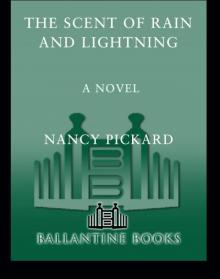 The Scent of Rain and Lightning
The Scent of Rain and Lightning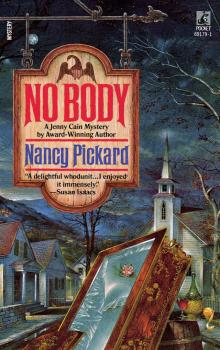 No Body
No Body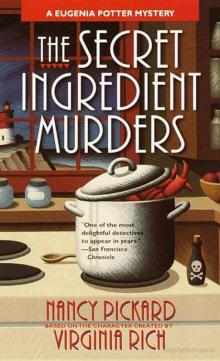 The Secret Ingredient Murders: A Eugenia Potter Mystery
The Secret Ingredient Murders: A Eugenia Potter Mystery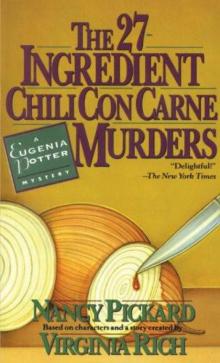 The 27-Ingredient Chili Con Carne Murders: A Eugenia Potter Mystery
The 27-Ingredient Chili Con Carne Murders: A Eugenia Potter Mystery Twilight
Twilight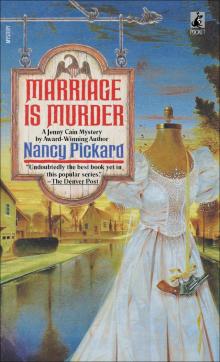 Marriage Is Murder
Marriage Is Murder I.O.U
I.O.U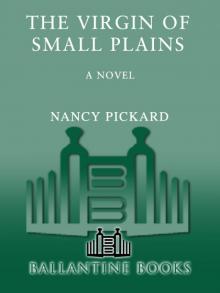 The Virgin of Small Plains
The Virgin of Small Plains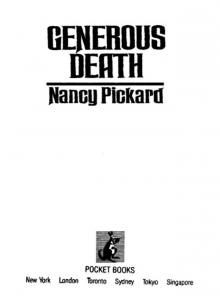 Generous Death
Generous Death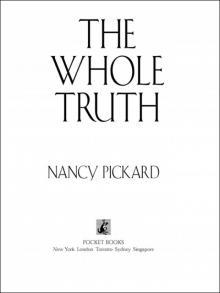 The Whole Truth
The Whole Truth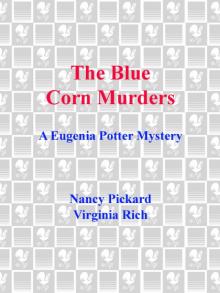 The Blue Corn Murders
The Blue Corn Murders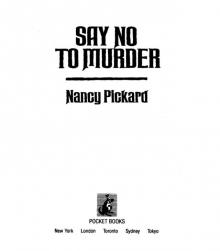 Say No to Murder
Say No to Murder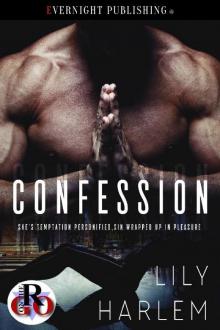 Confession
Confession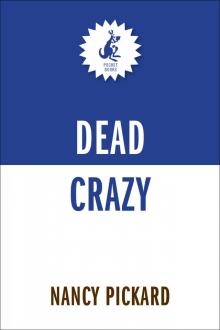 Dead Crazy
Dead Crazy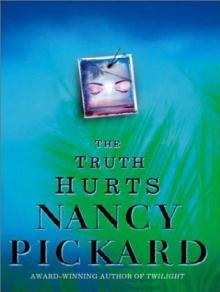 The Truth Hurts
The Truth Hurts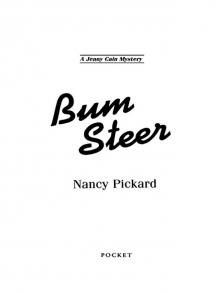 Bum Steer
Bum Steer